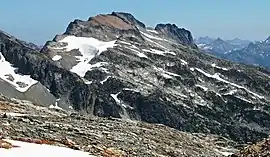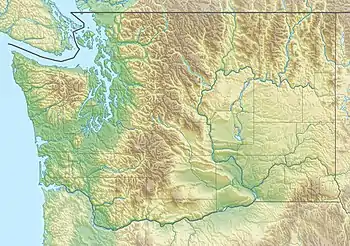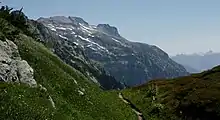Booker Mountain
Mount Booker, with an elevation of 8,284 feet (2,525 m), is located in the North Cascades of Washington, about 1.5 miles SE of Mount Buckner, between Park Creek and Stehekin River.[1]
| Booker Mountain | |
|---|---|
 Booker Mountain seen from Sahale Mountain | |
| Highest point | |
| Elevation | 8,284 ft (2,525 m) [1] |
| Coordinates | 48°28′31″N 120°58′45″W [2] |
| Naming | |
| Etymology | Booker T. Washington |
| Geography | |
 Booker Mountain | |
| Parent range | North Cascades |
| Climbing | |
| First ascent | August 22, 1964 by Dan Davis and John Holland[1] |

History
Landscape painter Abby Williams Hill, of Tacoma, Washington, was contracted by the Great Northern Railway Company to paint pictures of the North Cascades, and she first painted Mount Booker in 1903.[3] At the time of Hill's painting, the mountain had not yet been named; newspaper critics called it "No-name mountain."[3]
Abby Hill wrote to the National Geological Survey to determine the mountain's name, and the agency offered her the opportunity to name it.[4] She had previously traveled to visit Booker T. Washington (d. 1915), and she attended his lectures in Tuskegee, Alabama, in the fall of 1901. She was also very moved by her experiences with Jim Crow laws in the South, as well as by Washington's lectures.[4] As a result, Abby Hill named the mountain in honor of Booker T. Washington.[3]
Climbing history
The first ascent of the Northeast face of Mt. Booker was completed by Dan Davis and John Holland on August 22, 1964 [1]

References
- Beckey, Fred (2003). Climbing and High Routes: Stevens Pass to Rainy Pass. The Mountaineers Books. p. 335. ISBN 978-0-89886-838-8. Archived from the original on 2015-04-02. Retrieved 2015-03-14.
- "Booker Mountain". Geographic Names Information System. United States Geological Survey. Retrieved 2015-03-14.
- The Washington Historical Quarterly, The Washington University State Historical Society, 1920, pg 212
- Fields, Ronald (1989). Abby Williams Hill and the lure of the West (1st ed.). Washington State Historical Society. pp. 44–47. ISBN 9780917048630.